My wife and I began working remotely in 2009, long before the dawn of remote worker incentives. A year or two later, we took off to Europe for a few months and we have continued to travel a lot in the years since, typically taking work with us. As I sat by the pool at my resort yesterday working on this post, I realized quite a number of people around me who appeared to be doing the same thanks to a growing percentage of remote workers in the United States. As I enjoyed the 85-degree sunshine and thought of the impending snowstorm today at home, I extended my stay for a few more days because the allure of the continued change of scenery was strong.
But whereas I’m paying more (in the form of Hyatt points) for my short-term change of scenery, those with the flexibility to work from anywhere and the willingness to try out a change of scenery for a year or more can get nice incentives to move to different parts of the United States. I first wrote about these digital nomad incentives in 2020. Whether or not remote worker incentives are “working” I don’t know for sure, but I do know that the idea sure has caught on, with tons of communities willing to pay remote workers to relocate. I have updated this post to highlight some of the current opportunities in 2023 as well as resources to find more information for both programs within the United States and abroad.
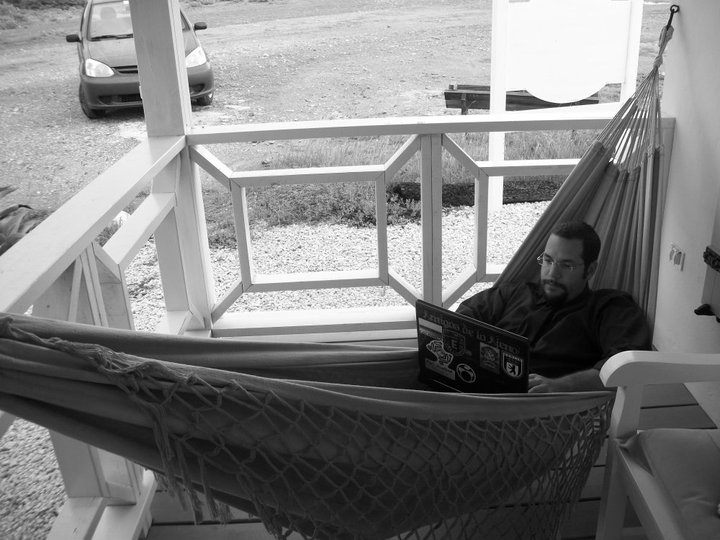
What are digital nomad remote worker incentives and are they legitimate?
The general idea is that some cities (and indeed now countries) see an opportunity in attracting new residents who come with their own well-paying jobs and money to inject in the local economy, so they offer remote worker incentives. Municipalities have long incentivized employers to relocate in order to bring good jobs to the area, but I assume that communities have determined it to be cheaper (and perhaps more effective?) to offer individual workers an incentive.
That’s not to say the programs come cheap: quite a few cities offer remote workers who make the move the chance to get thousands of dollars in cash and benefits (structured differently from one program to another). Almost all of these programs are designed to draw workers from outside of the local area (and in many cases from outside the state), so you generally will not qualify if you’ve already moved.
From there, it varies from one program to another, but generally speaking most programs offer some amount of cash up front and then split up the remaining incentives either monthly or after 6 months / 1 year (and in some cases an additional bonus after two years). Each program has different rules in terms of the timeline for moving after being accepted to the program and whether you need to buy or you can rent in the new town.
It’s worth noting that some incentive programs only offer a grant toward purchasing a home or a tax incentive. I’ve focused on opportunities for this post that include a cash incentive (and in many cases other benefits).
These programs certainly legitimately exist, though you should of course do your own due diligence. In most cases, I think you should be able to find information about these programs on official local government websites. Like anything in the Internet age, I’m sure there are people who have set up fake websites, so just do your homework before you apply and send off personal information.
How can you find remote worker incentives?
Back when I first wrote this post, I had to Google about looking for these digital nomad incentive programs. Now, with the growing popularity of these programs, it is very easy to find many of them.
There is now a website called “MakeMyMove.com” that lists remote worker incentives from around the United States (it appears to be sort of a mix between a “classified ads” of sorts for remote worker incentive programs and a headhunter program), and I think that all of the programs listed in this post can be found via that site (though some of these I had found before stumbling on MakeMyMove, including those that I first highlighted in this post a couple of years ago). Each program I’ve checked out through MakeMyMove I have also found through local government websites (and MakeMyMove has been featured in a number of major media outlets), and one local government website noted in this post mentions that they have partnered with MakeMyMove to handle applications for its program, so it certainly seems like a great resource.
You can of course also Google areas and “remote worker program” or “digital nomad incentive” to see what else is available and you’ll find a multitude of news articles blog posts, etc. I thought it was worth highlighting several opportunities in this post to show the types of things that are available, but there are many more in existence that I could list in a single blog post.
Example remote worker incentives programs for digital nomads in the United States
Ascend West Virginia remote worker incentives program

Ascend WV has a program that offers remote workers the chance to get up to $12,000 plus outdoor equipment incentives to move to one of three different areas: Morgantown (billed as a lively college town), the Greenbrier Valley, or the Eastern Panhandle. This program has been on for a couple of years in Morgantown, where they say they’ve had more than 50 people accepted so far, so there seems to be a growing community of remote workers there.
This offer includes up to $12,000 in cash (that’s $10K paid monthly over the first 12 months you live in the area and $2K after completing your second year) plus a bunch of incentives, which include a year of free outdoor recreation activities (like whitewater rafting and skiing) along with free equipment rentals for you and your family and friends. They also include access to coworking space.
I’ve rafted the New and Gauley rivers in western West Virginia and that area is beautiful. On the flip side, the Eastern panhandle isn’t very far from the Washington, DC area (Martinsburg, which is a town where they included housing examples, is an hour from Dulles airport according to Google maps). If I could convince my family to move, I might check out the Eastern Pandhandle for a year.
Greater Rochester, New York remote worker program

As an Upstate New Yorker myself, I have a number of friends from what some locals dub “The Real Roc City”. While I’ve not spent a ton of time in Rochester, I can at least say that every time I visit, I like it more. Of course, my visits don’t occur during the winter time, when Rochester can get hammered with snow, but with what is known to be one of the best children’s museums in the country (the Strong Museum is awesome), garbage plates, and major colleges & universities both in and around the city, it could be a great place to live (as long as you don’t mind the winter).
Greater Roc Remote is offering an incentive of $10,000 in cash (paid out as $4K at the beginning, $3K after six months, and $3K after a year) and “up to $9,000” in incentives for homebuyers (though I couldn’t immediately find terms or explanation of the additional grant money). While quite a few programs I checked out required moving from out of state, Greater Roc Remote requires moving from a place that is at least 300 miles from downtown Rochester.
Noblesville, Indiana digital nomad incentives program
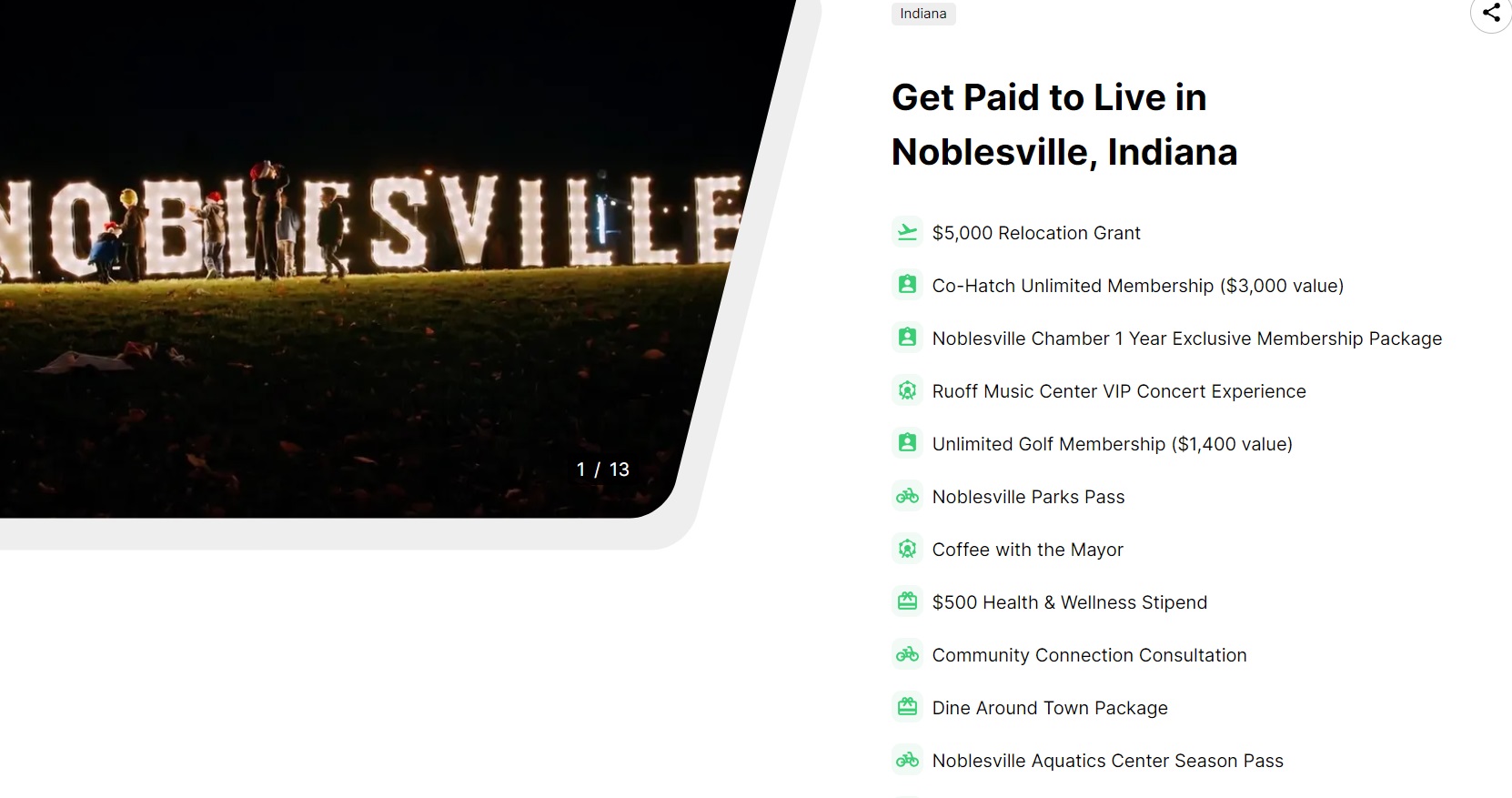
Noblesville, Indiana has a program that MakeMyMove touts as $15,000 in incentives, though in this case the cash incentive is $5,000 and the rest is in benefits. That certainly still may be attractive given the list of benefits above certainly sound appealing.
You can find information about this program on the Noblesville local government website, but as that document notes you have to apply through MakeMyMove. Terms of this deal indicate that you must live outside of Indiana and earn at least $60K annually to qualify.
Tulsa Remote Worker Program
The Tulsa Remote program has been around since 2018 and appears to still be running strong. Selected participants in the program receive $10,000 (split over a few installments over the course of a year), membership at a co-working space, supporting in finding housing, and more. They even allow for couples to apply separately if they each qualify for the program — meaning that it might be possible for a couple to qualify for $20K in grant money if both partners are selected.
The FAQs page says that participants selected for the program need to move during the current program year, though I believe that during the application stages it indicated that you would need to commit to moving to Tulsa within 6 months of being accepted.
Chose Topeka remote worker incentive program
Choose Topeka blends a program that incentivizes people to seek existing jobs in Topeka (which offers up to $15K in funds for a home purchase and is partly employer-subsidized) with a remote working program incentive that ranges from $5K for renting in Topeka to $10K for buying a home as a remote worker. I found the last bit in the screen shot above to be particularly brilliant marketing: Sandwich shop chain Jimmy John’s throws a bonus thousand bucks on top for those who relocate within one of their three Topeka sandwich delivery zones. I’ve never even eaten a Jimmy John’s sandwich and I’ll tell you that the next time I see one I’m getting lunch just as a tip of the hat to this.
Unlike Tulsa, Topeka limits things to one relocation incentive per household. From their FAQs, it looks like they only began accepting applications for remote worker slots a couple of months ago and the site does seem to still accept applications (though YMMV).
The Shoals Alabama remote worker incentive program
RemoteShoals.com advertises that you can get $10,000 to work from The Shoals in Alabama and that you can qualify if you earn $52K per year or more, though when you dig into the terms & conditions you will find that there is actually a sliding scale of payouts depending on your salary (ranging from $6K for those who earn between $52K-$62,399 up to $10K for those earning $124,800 or more).
This program explicitly requires that participants be physically present in The Shoals 75% of the program term. That certainly makes sense to me, though I hadn’t noticed a similar requirement in other programs (though it is certainly possible that they each have similar requirements that are only seen by those who advance in the selection process).
Digital nomad visa programs abroad
Several foreign countries are also offering programs for remote workers, though in many cases they aren’t incentives necessarily but rather just the rare possibility (for a tourist) to spend a year abroad living as a local. When I first wrote this post, all of the international remote worker programs I’d researched were simply offering the opportunity for an extended visa, though I now see some international programs offering tax benefits for remote workers, though I’m not a tax professional, so I would encourage doing your own research on tax benefits or implications for moving abroad.
Two resources that list lots of these digital nomad visas are:
- Countries Offering Digital Nomad Visas With Amazing Tax Benefits (from Deskless Nomad)
- 51 Countries With Digital Nomad Visas – The Ultimate List (from NomadGirl)
Here are some examples of digital nomad visas that I had highlighted in my original post:
There are now so many of these that international programs seemed like they would be worth a separate post entirely.
Bottom line
Many people have been freed from location dependence and so the competition to bring their salaries and the associated economic benefits seems like it continues to heat up. I find this really interesting in the sense that it brings new opportunities for people to discover areas they may have overlooked. Over the past 10 or 14 years, I’ve often said that working online gives you the freedom to live anywhere, but that it is hard to pick a new place to live without a job tethering you there, especially when you don’t have an existing social network and familiarity with that place. These programs offer an incentive to get people over that hurdle which I could see being something that tilts the balance for those in a position to take advantage. At the very least, I certainly have some new places on my radar for domestic trips. Surely I’m not the only one with that reaction — and that shows how this could be an economic win beyond just the new workers these programs draw.


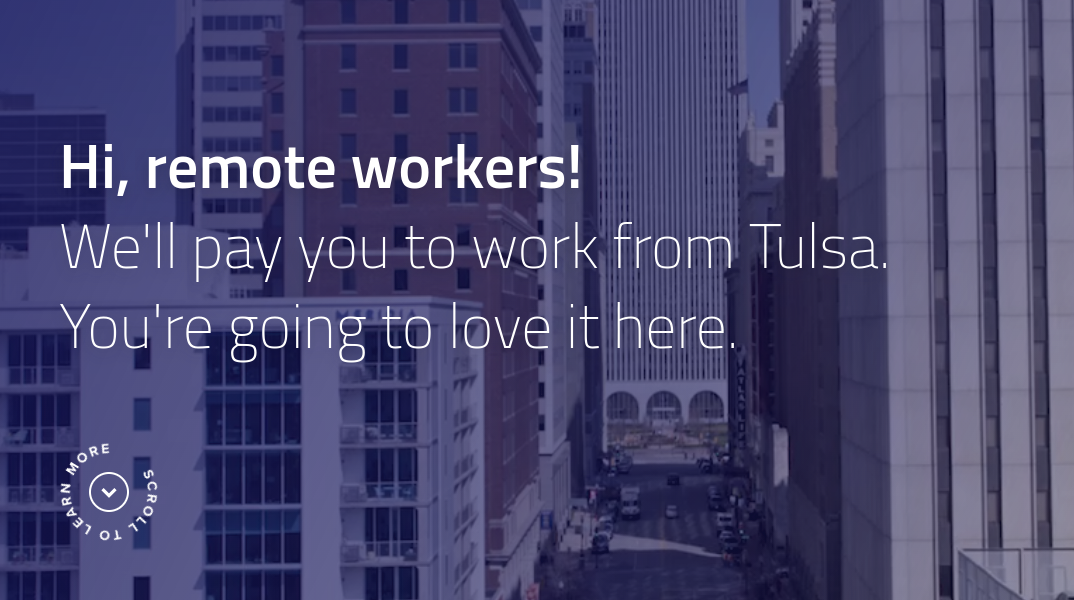
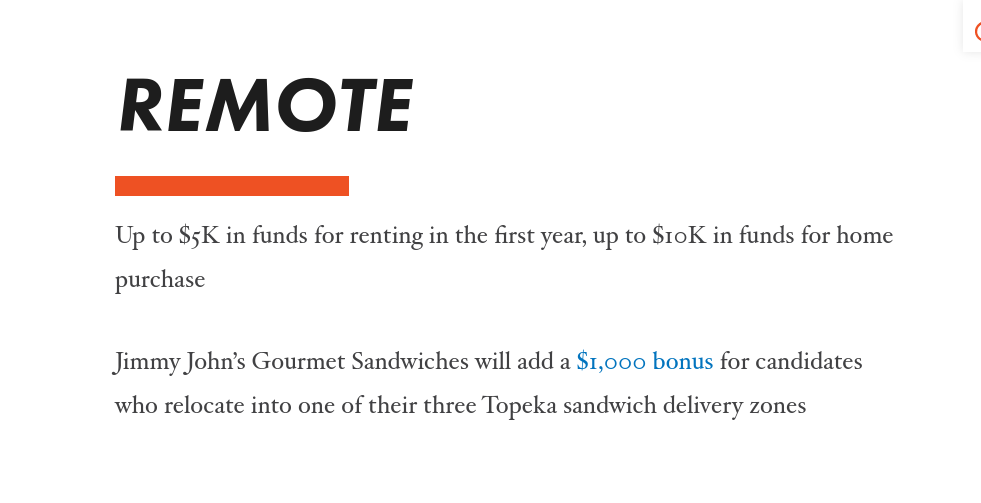
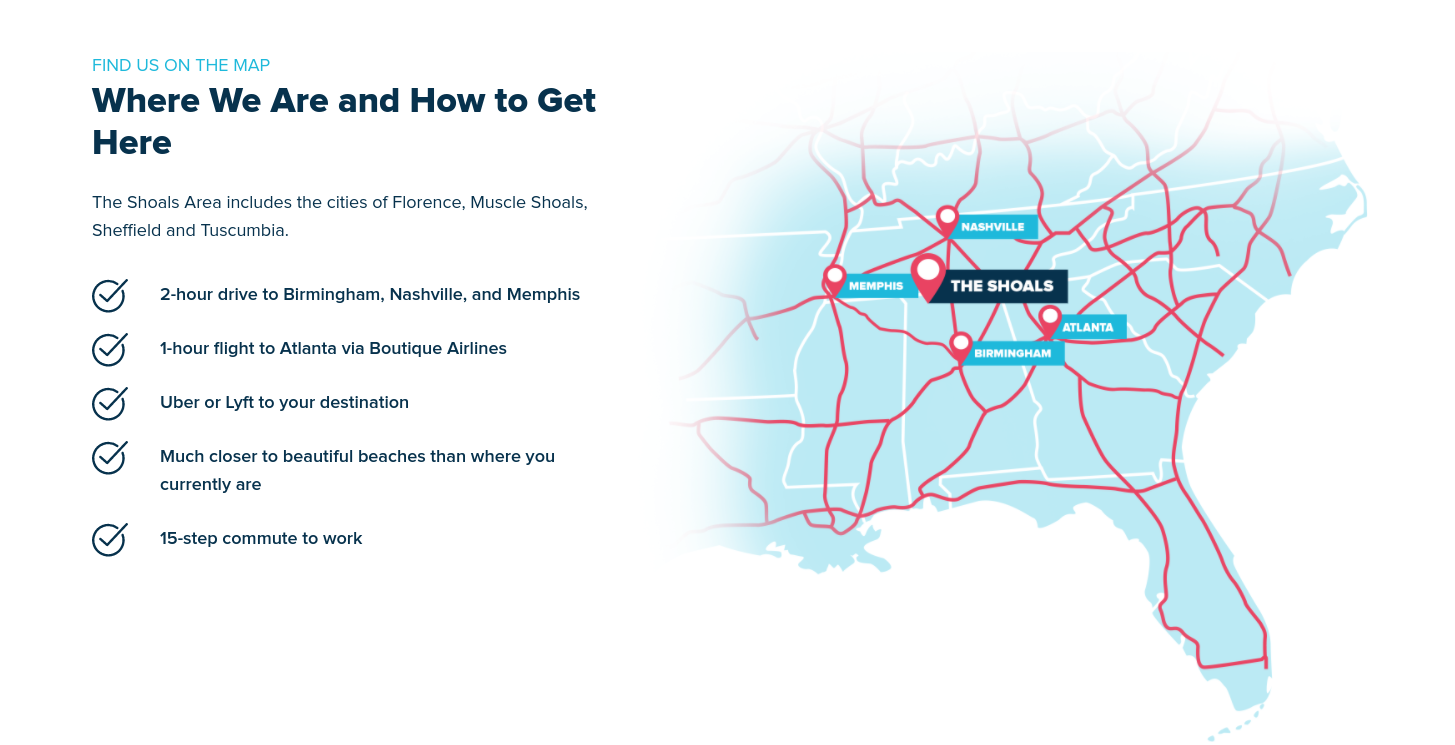
[…] common nationwide since the COVID-19 pandemic popularized remote work, with some even offering thousands of dollars and other free perks to […]
Eastern Panhandle application is closed as of now 🙁 Hopefully it opens up soon
We’d be down to check out WV, some awesome outdoor stuff there! Unfortunately neither P2 or I do anything that could possibly be remote (well, other than churning for me)
Very interesting article but people also need to consider state/local income taxes at their current & prospective locations. This is especially true if you live in one of the states with no state income tax (Alaska, Florida, Nevada, South Dakota, Tennessee, Texas, Washington, and Wyoming).
I’m surprised that more of these programs don’t have clearly stated residency requirements. I have to imagine that the possibility exists that people would pretend to move there without actually delivering the benefits of residence (local spending and tax payments) that the programs are designed to produce.
Also worth noting that some of these places align with good places to invest in real estate. Rochester, for instance, frequently appears in list of best places to invest in rental properties. If you were to move to one of these places, get the $10k, and additionally get $10K of help in buying a two or three unit house then you could be very nicely positioned in a couple of years in terms of rental income.
Just going to say it – it would take a lot more incentive to get me to move to any of the places on this list. I’m guessing there’s a reason they are desperate for high income remote workers. You might be the king in any one of those places, but can’t imagine living in any of these places. Just me personally.
Different strokes for different folks. I could imagine living almost anywhere for a year.
Yeah of course we all have different tastes. I was just hoping something would jump out at me is all. It just seems like these places may struggle for population.
Shocking that the Maldives isn’t paying people to relocate…
Well yeah, that’s logical. Places that aren’t struggling for population wouldn’t offer an incentive for more people to come and places that are offering an incentive logically think they need to in order to attract people to try it out. They’re banking on people who wouldn’t have come without the incentive, but they think that if people have a reason to come they might end up loving it. I know there are plenty of places I wouldn’t have visited if not for award availability or a cheap flight that I’ve ended up loving, so I think these programs make sense.
I think the chance to live in an up and coming area and meet other folks doing the remote work thing seems kind of exciting. A lot of my favorite trips have been to less populated areas anyway and I find something interesting about almost everywhere we go. Not that I don’t love cities, I do. But I can still travel to those, same as I do now.
One of the things I long hated about living in a rural town was that there is “nothing to do”. However, as I get older, I’ve come to appreciate the lower cost of living – I’m not eating restaurant food four times a week at home and I’ve come to enjoy the outdoors more. That’s not to say that I wouldn’t live in a larger city – the convenience certainly is nice.
But I can certainly understand that these aren’t for everyone. If they were, they would probably cease to exist.
also echo this:
I know there are plenty of places I wouldn’t have visited if not for award availability or a cheap flight that I’ve ended up loving
I echo this, especially for some one who travels A LOT. Home is just a base and launch pad to explore this big old world. Anywhere is the same as long as there is a convenient airport nearby.
Democratic Republic of Congo….that’s the remote working report I want to see from you Nick.
Or maybe even better – Chad. One never hears about Chad. At least with DRC we hear about cobalt mines or what not.
But you did say — almost…. 🙂
My assumption is there a variety of reasons for having these programs and some might be to entice folks to try a new way of life that’s not currently on their radar. A lot of big-city people are realizing they don’t need to live in the big city to realize a meaningful and enjoyable life. (I’m one).
I love life off the beaten path and exploring. That’s basically the only reason I travel
Pretty sure the only reason these programs exist is for economic development in the sponsoring jurisdiction. There are many reasons that a move might appeal to people, with “trying a different way of life” being one of them, and the cash as an additional incentive to pull the trigger and to choose that particular location.
I visited Lewisburg West Virginia to check out the town after hearing about this offer. I’m a lifelong city dweller but like to get outdoors. Lewisburg is a really nice town in a beautiful area with tons of outdoor access. It took me by surprise how much I liked it. At a different point in my life I could imagine relocating there with my future family.
[…] Digital nomad incentives: Get paid $10K to move […]
It gotta feel weird to pay taxes to the government, who then hands the money over to your new neighbors who can afford more stuff than you and may eventually price you our of the neighborhood.
I’m supportive of social programs and think this sort of thing makes sense. However, there’s some irony in these programs existing primarily in parts of the country that prioritize small government, low tax, and free market.
I had previously missed this comment. Funding varies. It’s surely from tax money in some places. In West Virginia, it was funded by a large donation from a wealthy couple (I don’t remember their names or know anything about them, just that it was funded by private donation). In Topeka I believe it is funded by the employers in the program. I’m not going to get into debating the politics of these programs (I’m sure we’d all have different opinions on that and I’m not looking to turn this into that discussion), but figured it was worth noting that they aren’t all funded the way you describe.
The incentive to move overseas is taxes. For example, in Barbados I believe under their digital nomad visa program you would not be subject to local income taxes, and if you meet the rules (need to check with your CPA, but it’s something like not being in the US for more then 30 days per year) you would not need to pay US income tax on the first ~100k in income. This can easily save $25-30k in taxes of u are earning $100k+ per year.
35 days or less in the US, unless they changed it from when I lived abroad
Interesting insight…
How’s Barbados during Sargassum Seaweed season these days? 🙂
Looking at Facebook-Redsargazo for Cancun/Tulum…already looking bad. Late Feb / March is too late to visit for beaches now. Unless you stay up North.
I’m pretty sure Finland has a program too…
Link?
I live in Tulsa, and it’s surprisingly nice, not at all what you’d think.
One thing to mention is that it’s a significant “raise” to relocate to a lower cost of living area, and Tulsa is one of the lowest in the US.
As for Tulsa remote, they get tens of thousands of applicants a year and this will be their 4th cohort. It’s nice having a ready made way to pick up interesting friends, I know several people from the program.
Finally, I won’t name names, but you wouldn’t be the first travel blogger to relocate to Tulsa under this program…
And Southwest has a reasonable presence out of TUL. Nonstop to DAL, PHX, HOU, LAS, STL, DEN. Although AA is certainly dominant as it’s one of their service depos.
For a third rate city, it’s reasonably connected. American, United, Delta, Frontier, Southwest and Allegiant all operate out of TUL.
I’m legitimately interested. If we get a vaccine and get things under control, I could see my family applying. Stephen speaks highly of Tulsa. I’ve always enjoyed other Midwest cities, so I feel like it would be worth a shot. Like you said, I imagine you get to know some interesting folks. I see a lot of positives.
If you come visit to check it out, I’d be happy to show your family some highlights!
And as Stephen said, at 5K a night for Hyatt it’s easy peasy. I doubt there will be much competition for suites as well, so good use for Globalist.
Worst case you spend a few days in a super cheap place that’s very family friendly.
That just shows the nice local vibe there already!
But then we’d miss you in upstate NY. And that’s not just because I love to see you using ALB for many example flights.